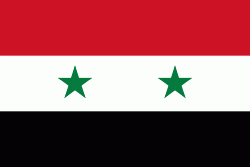Qardaha (Al Qardāḩah)
Qardaha (القَرْدَاحَة / ALA-LC: Qardāḥah) is a town in northwestern Syria, in the mountains overlooking the coastal town of Latakia. Nearby localities include Kilmakho to the west, Bustan al-Basha to the southwest, Harf al-Musaytirah to the southeast and Muzayraa to the north. According to the Syrian Central Bureau of Statistics, Qardaha had a population of 8,671 in 2004. It has a predominantly Alawite population and is the traditional home of the al-Assad family, which has ruled Syria since the 1970 Corrective Movement.
Syrian President Hafez al-Assad, who ruled from 1970 to 2000, was born in Qardaha. Under Assad, the government poured massive investments into Qardaha, Latakia and the surrounding region. Qardaha has many luxurious villas. A major statue of Hafez al-Assad is found in the town center, and a huge mausoleum containing the graves of Bassel al-Assad and Hafez al-Assad is also located there. Hasan al-Khayer was also born in Qardaha.
Qardaha has a hot-summer Mediterranean climate (Köppen climate classification: Csa). Qardaha is in a mountainous area, but its altitude is only between 350 and 500 meters. It is in a beautiful forested area. Qardaha has much rainfall. The average high temperature in July is 29 °C, and in January is 7 °C. There is nearly 828 mm of rainfall annually and three days of snow in January. The climate and nature in Qerdaha favour agriculture, and there are apple and orange plantations and tobacco farms.
Source #3 Climate Zone (Rainy and snowy days)
Syrian President Hafez al-Assad, who ruled from 1970 to 2000, was born in Qardaha. Under Assad, the government poured massive investments into Qardaha, Latakia and the surrounding region. Qardaha has many luxurious villas. A major statue of Hafez al-Assad is found in the town center, and a huge mausoleum containing the graves of Bassel al-Assad and Hafez al-Assad is also located there. Hasan al-Khayer was also born in Qardaha.
Qardaha has a hot-summer Mediterranean climate (Köppen climate classification: Csa). Qardaha is in a mountainous area, but its altitude is only between 350 and 500 meters. It is in a beautiful forested area. Qardaha has much rainfall. The average high temperature in July is 29 °C, and in January is 7 °C. There is nearly 828 mm of rainfall annually and three days of snow in January. The climate and nature in Qerdaha favour agriculture, and there are apple and orange plantations and tobacco farms.
Source #3 Climate Zone (Rainy and snowy days)
Map - Qardaha (Al Qardāḩah)
Map
Country - Syria
 |
 |
| Flag of Syria | |
The name "Syria" historically referred to a wider region, broadly synonymous with the Levant, and known in Arabic as al-Sham. The modern state encompasses the sites of several ancient kingdoms and empires, including the Eblan civilization of the 3rd millennium BC. Aleppo and the capital city Damascus are among the oldest continuously inhabited cities in the world. In the Islamic era, Damascus was the seat of the Umayyad Caliphate and a provincial capital of the Mamluk Sultanate in Egypt. The modern Syrian state was established in the mid-20th century after centuries of Ottoman rule. After a period as a French mandate (1923–1946), the newly-created state represented the largest Arab state to emerge from the formerly Ottoman-ruled Syrian provinces. It gained de jure independence as a democratic parliamentary republic on 24 October 1945 when the Republic of Syria became a founding member of the United Nations, an act which legally ended the former French mandate (although French troops did not leave the country until April 1946).
Currency / Language
| ISO | Currency | Symbol | Significant figures |
|---|---|---|---|
| SYP | Syrian pound | £ or لس | 2 |
| ISO | Language |
|---|---|
| AR | Arabic language |
| HY | Armenian language |
| EN | English language |
| FR | French language |
| KU | Kurdish language |















